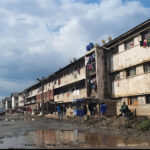A 25-year-old man from Mhimha Close, Budiriro 2, has found himself in legal trouble after an audacious attempt to meet President Emmerson Mnangagwa. Fungai Mukamba appeared in court facing a charge of disorderly conduct following an incident at the New Parliament building in Mt Hampden last week.
The state alleges that on February 6th, Mukamba travelled to the August House with a singular demand: a private audience, a ‘man-to-man’ meeting with the Head of State.
Prosecutor Dzidzai Josiah told the court that Mukamba became agitated and violent when his request for entry was denied, leading to his subsequent arrest. The court has ordered that Mukamba undergo a mental examination, and he has been remanded in custody until February 24th for a routine appearance.
Meanwhile, in the wider political landscape, Zimbabweans find themselves looking towards Vice President Constantino Chiwenga as a potential force against the extension of President Mnangagwa’s term in office. This comes amidst a backdrop of a weakened opposition, disorganised civil society, and a shrinking space for dissent.
Chiwenga’s public opposition to what is known as the “2030 Movement” – those within ZANU-PF pushing for Mnangagwa to remain in power beyond the constitutional term limits – is offering a glimmer of hope to those who oppose the move. He has been a vocal critic of corruption and has notably refused to participate in slogans demanding the extension of Mnangagwa’s term.
This is not the first time that Chiwenga, a former military general who played a pivotal role in the ouster of President Robert Mugabe in a military coup in November 2017, has publicly denounced corruption. Just days earlier, on January 22nd, while addressing mourners at the burial of three heroes at the national shrine, he warned that corruption was threatening the very ideals of the liberation struggle.
However, analysts caution that it will take more than just one individual to prevent the term extension. Kudakwashe Munemo, a Harare-based political analyst, argues that “only a mass movement of citizens of Zimbabwe are capable of ensuring the constitution is not amended for a third term of office, especially given the poor social services delivery, an ailing economy and militarisation of state institutions.”
Admire Mare, the head of the communication and media studies department at the University of Johannesburg, believes that “it is more than personalities. It’s various social forces. Given that the constitution is on the line there is going to be a broad-based alliance of factions within Zimbabwe African National Union-Patriotic Front (ZANU-PF), opposition parties and civil society that will push back against Agenda 2030.”
In mid-January, churches under the Zimbabwe Heads of Christian Denominations (ZHOCD) also added their voice, encouraging Mnangagwa to adhere to the constitutional term limits. Chiwenga remains one of the few ZANU-PF leaders publicly opposed to removing these limits from the constitution.
Adding another layer to the complex political landscape, war veterans, led by ZANU-PF central committee member Blessed Runesu Geza, have called for Mnangagwa to step down, accusing him of nepotism, corruption, and a failure to revive the struggling economy. These war veterans are also against the proposed removal of term limits.
This echoes the events leading up to the 2017 military coup, where war veterans, then led by Victor Matemadanda and Chris Mutsvangwa, opposed President Robert Mugabe. “Last time it was Matemadanda who was vocal against Mugabe. This time there is Blessing Geza, Knox Chitiyo and Clive Malunga. History is repeating itself,” Mare observes.
Political analyst Vivi Gwede believes that the war veterans’ stance offers valuable insight into the political dynamics within ZANU-PF. “They will give the anti-2030 movement a mobilisation base. This is a boost to Chiwenga. Their sentiments appear to be backed by and to be backing a political faction,” she says.
However, while backing from war veterans is undoubtedly significant, some analysts question whether it is enough, particularly given the changing power dynamics within ZANU-PF. Munemo notes the “militarisation of the state which gives the military a deciding stake,” and suggests that Chiwenga, having been at the helm of the military structure for many years, “may have planted seeds in addition to his relationship with China.”

Follow @MyZimbabweNews












